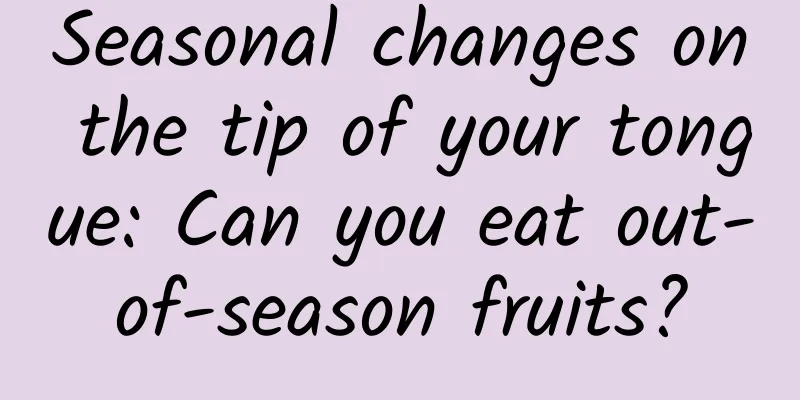Seasonal changes on the tip of your tongue: Can you eat out-of-season fruits?

|
For a long time, people have had a subtle attitude towards off-season fruits. Some people think that seasonal fruits are the healthiest, and off-season fruits violate the laws of nature and are not suitable for consumption; at the same time, some people think that off-season fruits are rare and enrich the variety of fruits. The Analects of Confucius says "Don't eat out-of-season fruits", so with the development of science and technology, are the off-season fruits obtained by modern people in various ways really not suitable for consumption? First of all, we need to understand what the off-season fruits on the market are. According to the current classification standards, there are usually three types of "off-season fruits". The first is long-term preservation. With the rapid development of long-term preservation and storage technology for fruits and vegetables, the original "seasonal" fruits have extended their storage life with the help of refrigeration and preservation technology, and can still be the choice of consumers after the production season. Common fruits such as bananas, grapes, apples, citrus, pineapples, etc. are picked in warm weather, stored, and preserved until winter, which can almost meet the supply throughout the year. The second is "greenhouse planting". As a popular agricultural project in recent years, the greenhouse's powerful insulation effect keeps fruits and vegetables in a relatively warm environment. In the greenhouse, they are not affected by severe cold weather and can still grow and bear fruit normally to meet people's needs. Greenhouse planting has brought us many fruits in the cold winter. This is also a very common practice at present. The third is planting in different places, which requires convenient transportation. A fruit plant may be out of season in one place, but in season in another place. Take my country as an example. Due to the warm climate in southern regions such as Guangdong and Hainan, there are still many fruits and vegetables that can be planted even in winter. They are all seasonal fruits and vegetables in the local area. Fast and convenient logistics can deliver these local seasonal fruits to thousands of households. Judging from these classifications of off-season fruits, if there are no dangerous factors in their growth, transportation, and storage, then off-season fruits can be eaten. However, there are still many people in the market who are still full of concerns about off-season fruits. Some people think that a lot of pesticides will be used in the cultivation process of off-season fruits, which will cause health risks and harm to health. This concern is actually biased, because seasonal fruits will also use pesticides during the planting process. As long as the fruits are grown in a standardized manner, normal consumption will not cause harm to human health. The results of national random inspections also show that the phenomenon of excessive pesticide residues in greenhouse fruits and vegetables is not more serious than that of fruits and vegetables grown in natural fields. You must know that being labeled "off-season" does not mean that there are pesticide residues. The type and amount of pesticides used, as well as the length of degradation time (referring to the time from the last application of pesticides to the time they are put on the market for sale) are the determining factors. In order to eat safe off-season fruits, on the one hand, the state must strengthen supervision and improve the scientific awareness of vegetable farmers to grow vegetables, so that they can use high-efficiency, low-toxicity, and low-residue pesticides in accordance with the requirements and dosage of national standards. On the other hand, for safety reasons, consumers can use methods such as "ventilation and drying, soaking in baking soda water, washing with running water, and blanching in boiling water" before eating fruits, which can remove more than 80% of pesticide residues. In addition to the problem of pesticide residues, some people think that off-season fruits need to use plant hormones, and eating them will cause people to mature early. This rumor has also been popular on WeChat Moments, making many parents afraid to buy off-season fruits. First of all, a certain amount of plant growth regulators, also known as plant hormones, are used in modern planting processes. Both seasonal fruits and off-season fruits may be used. In addition, all fruits naturally contain a certain amount of plant hormones. However, the effectiveness of plant hormones is generally very low, and they are different from the molecular structure and mechanism of action of human hormones, and will not have adverse effects on the human body. In short, the emergence of off-season fruits may be due to the development of planting technology. In the past, fruits were born in season, but new planting technology broke the climate constraints and provided suitable light, temperature, water source and soil for plant growth. Or it may be due to the development of transportation. The original long distance became an obstacle to the transportation of fresh fruits, but air, land and sea transportation provided conditions for people to eat so-called off-season fruits from other regions. The emergence of off-season fruits is actually a good thing. People can get and supplement nutrition from them, especially vitamins and minerals. However, off-season fruits are not without disadvantages. Compared with seasonal fruits, their transportation and storage costs are high. Scarcity makes things expensive, and the price of off-season fruits is relatively expensive. At the same time, compared with locally produced fruits, the nutrition of off-season fruits may be lost in long-distance transportation. In addition, since the growth and storage conditions of off-season fruits are not as good as those of seasonal fruits, they are definitely inferior in taste, aroma and nutrient storage. For example, the sugar content of greenhouse tomatoes is lower than that of naturally grown tomatoes, and the protein and vitamin C content of greenhouse cucumbers will also be reduced. Therefore, we should take the rumors and advantages and disadvantages of off-season fruits into consideration. Modern life gives us more choices when buying fruits. The appearance of off-season fruits also brings us different taste experiences in different seasons, and can also serve as a good source of vitamins, minerals and dietary fiber for the human body. |
<<: 350 kilometers per hour! This high-speed railway will cross the Qinling Mountains
>>: Do you have any of these scalp problems? Be careful, they may be causing the problem!
Recommend
Brand KOL marketing skills!
Nowadays, influencer marketing is becoming an inc...
How does Kuaishou Store analyze material data? Where to analyze?
Let me introduce to you the part about material d...
QQ Music and NetEase Cloud Music are actually the same, taking advantage of users
Xiami Music failed to survive the spring of onlin...
A fire broke out in a high-rise building in Tianjin. How should we escape when a fire breaks out in a high-rise building?
According to China National Radio, a fire broke o...
Latest research! Not everyone needs eight glasses of water a day
From childhood to adulthood Always hear people sa...
Practical tips: How can APP achieve precise operation?
When it comes to APP operation methods , a simple...
How can Toutiao quickly gain millions of followers? Share 10 marketing tricks!
Many people have noticed that Toutiao, which has ...
How can advertisers in the tourism industry take advantage of the summer vacation to place advertisements?
The college entrance examination is over, and now...
Unity3D game special effects comprehensive training course [HD quality with materials]
Unity3D game special effects comprehensive traini...
Facebook Marketing: 9 Tips to Help You Take Advantage of 2 Billion Users
In 2004, Mark Zuckerberg , a sophomore at Harvard...
Cleverly use leverage to attract 1 million users
How to define seed users ? Three conditions for d...
What does it mean for WeChat to open 11 interfaces?
WeChat has opened 11 JS-SDK interfaces, including...
How to get an elephant to give you a pedicure? Learn from Pavlov
Almost all students who have worked with various ...
Albert follows Friends and speaks English easily in 100 days
Albert follows Friends and speaks English easily ...









